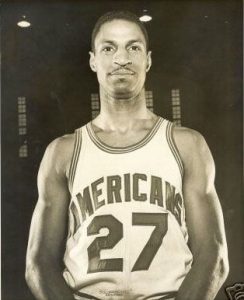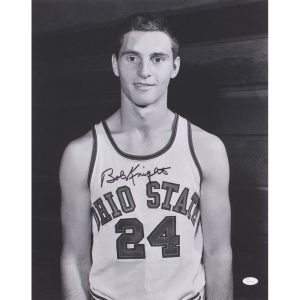With the 2020 NCAA tourney tipping off next month, we will spend this month taking a walk down memory lane with a choice collection of players/coaches who are celebrating an awesome anniversary this year. From some game-winning FTs in the 1955 tourney (65th anniversary) through a 17-PT comeback win in the 2015 1st 4 (5th anniversary), these legends have all carved out a little piece of history in past Marches. We continue our series with Bobby Knight, who won championships at every stage of his career: the 1960 NCAA title as a player at Ohio State, 3 NCAA titles in a 12-year span as head coach at Indiana, and an Olympic gold medal as head coach of team USA in 1984. The 8-time Big 10 COY was inducted into the Naismith Basketball Hall of Fame in 1991 and the College Basketball Hall of Fame in 2006. HoopsHD’s Jon Teitel got to chat with Mel Nowell (1 of Bobby’s teammates on the 1960 title team) about the 60th anniversary of becoming the only basketball team to win a national title in Ohio State history and his teammate’s path to becoming the winningest coach in D-1 history until he was passed by 1 of his former players.
You and Bobby played for Hall of Fame coach Fred Taylor at Ohio State and had a pair of future Hall of Fame teammates in John Havlicek/Jerry Lucas: what is the most important thing you ever learned from Coach Taylor, and could you tell at the time that Knight would end up becoming a coach himself? Fred had his priorities intact right from the beginning. He taught us that school came 1st and wanted us to stay eligible while doing the best we could. Basketball was also a crucial part of why we were there, and everything else came in 3rd. He was extremely well-organized in his practices and we had a fantastic conditioning program: I never recall any of us asking to be taken out of a game due to getting tired. We would run after practice and push ourselves to be in the front of the pack. Any time we needed to make a strategic change during the game it was easy because he had always prepared us for that during practice. I learned quickly after meeting Bobby that he was very intelligent: he was able to relax off the court and could easily take care of his homework and get A’s and B’s. He worked really hard in practice…to the point that some of our seniors asked Coach Taylor to tell Bobby to relax a bit!
In the magical 1960 NCAA tourney you had 4 straight wins of 15+ PTS en route to beating Cal in the title game: what did it mean to you to win a title? We beat a good Detroit team during the season and were all pleasantly tickled as we kept winning, but we did not know what would happen in the tourney after we lost at Indiana in the regular season. It felt great to win our semifinal and then watch Oscar Robertson and Cincinnati battle Cal to see who we would end up playing in the final. We started off with confident scoring and good defense due to our game plan: I backed off of the guard I was assigned to in order to help defend All-American Darrall Imhoff. Imhoff allegedly told his coach (Hall of Famer Pete Newell) at halftime that the reason he had so few rebounds is because our team had not missed many shots. It was the 1st time I knew what elation felt like: I was so overjoyed that I accidentally kicked 1 of my teammates in the chest!
In the 1973 NCAA Final 4 as head coach at Indiana, Bobby lost to 6-time defending champion UCLA: where does Bill Walton (who nearly had a triple-double with 14 PTS/17 REB/9 AST) rank among the greatest players that you have ever seen? After watching Kareem Abdul-Jabbar do his thing for 3 years I did not think it could get any better than that, but Coach John Wooden got someone in Bill who was just as big and just as good. I was amazed at how talented Bill was but did not realize until later reading Wooden’s book that it would be hard to keep them motivated because they were so great. Wooden’s fear of his players becoming overconfident proved true, as they did not win their 3rd straight NCAA title in 1974.
Take me through the 1975 NCAA tourney:
He was undefeated entering the tourney despite leading scorer Scott May breaking his arm in a win over Purdue that February: do you think that he would have won the title that year if May was healthy? I definitely think they would have won it if Scott was healthy: he was a very important part of their team. It reminded me of when Jerry Lucas got hurt in the 1962 NCAA tourney and tried to play even though he was not close to 100%.
Kent Benson had 33 PTS/23 REB in a 2-PT loss to eventual national runner-up Kentucky (which some have called 1 of the 10 best tourney games ever): how close did the Hoosiers come to winning the game? That was an example of Bobby’s great coaching when he helped turn Benson into such a productive player.
In the 1976 NCAA tourney title game after Bobby Wilkerson had to be rushed to the hospital in the 1st half, tourney MOP May scored 26 PTS to beat Michigan and clinch the title: how hard is it to beat a team 3 times in 1 season, and do you think that we will ever see another team go undefeated? It is extremely hard to win 3 in a row because the team that loses the 1st 2 has even more motivation. That was 1 of the few tourney games I remember going to in person. We saw a few years ago that Kentucky was almost able to go undefeated, but I do not think that it will ever happen again because there is too much talent throughout the sport.
In the 1979 Pan American Games in Puerto Rico as coach of team USA his team went 9-0 and won a gold medal while averaging more than 100 PPG: how on earth did he get ejected from the opening game (a 48-PT win over the Virgin Islands)? He is devoted to having his team excel: when the refs make an occasional mistake it was tough for him to not be intense even if he had a large lead. It would get to him at times and sometimes he would lose control of his emotions. You do not accomplish everything that he did without having a strong inner drive, and if he could intimidate the officials and get away with it in order to have some discretionary calls go his way then I think he would do it.
Take me through the magical 1981 NCAA tourney:
The title game was delayed following the assassination attempt on President Ronald Reagan: did he feel that the game should have been delayed? I do not know how he felt but you do not want the normal momentum of postseason play to stop. That being said, he has a lot of respect for our country, which caused him to feel torn.
Tourney MOP Isiah Thomas had 23 PTS/4 STL to beat North Carolina and win the title: did he feel that the Spectrum had become his lucky arena (after winning his 2nd title there in a 5-year span)? In my opinion I would not put it past Bobby to like a special place such as the Spectrum. I recall having a fond affection for a specific venue based on my own experience at the Cow Palace in San Francisco, where we won the title in 1960. When I became an NBA rookie with the Chicago Zephyrs we had a regular season road game against the San Francisco Warriors that had to be moved to the Cow Palace due to a scheduling conflict with their normal home court. I got into the game and scored a career-high 25 PTS that helped us make a comeback en route to an 8-PT win. It was the 1st time that we had beaten the Warriors since they were led by Wilt Chamberlain (who scored 37 PTS) so I definitely felt some good vibes from being on a court where I had previously had success.
At the 1984 Olympics he led team USA to an 8-0 record en route to winning the gold medal: was that the most talented team that he ever coached (Steve Alford/Patrick Ewing/Michael Jordan/Chris Mullin)? I know that he recognized talent and it was a great opportunity to put already-molded players in the right place to be successful. I am sure that he felt really good about it because not many people get the chance to work with that kind of talent.
In the 1987 NCAA tourney title game, tourney MOP Keith Smart scored 21 PTS/9-15 FG inclduing a 16-foot shot with 4 seconds left in a 1-PT win over Syracuse to clinch his 3rd title in just over a decade: where does that shot rank among the best in Hoosiers history? I remember watching it when it happened and it was not an easy shot: most players do not practice that shot because usually you have to deke someone to hit a pull-up shot. It was a fantastic shot and must be 1 of the most important shots for Indiana ever.
His 902 wins were the most in D-1 men’s history until Coach Mike Krzyzewski passed him in 2011: what made Knight such a great coach, and how proud is he of his former Army player? To win more games than anyone else is a statement unto itself and something to be extremely proud of. I think that having another winner like Mike Krzyzewski who he coached and molded made Bobby extremely proud.


